|
Olga Lepeshinskaya (biologist)
Olga Borisovna Lepeshinskaya (russian: Ольга Борисовна Лепешинская) born as Protopopova (russian: Протопопова) (August 18, 1871 – October 2, 1963), was a Soviet pseudo-scientist, who advanced her career as a biologist in the USSR Academy of Medical Sciences through fraudulent claims and personal ties with Vladimir Lenin, Joseph Stalin, Trofim Lysenko and Alexander Oparin. She rejected genetics and was an advocate of spontaneous generation of life from inanimate matter. Biography Lepeshinskaya completed her study as a feldsher in St. Petersburg in 1887 and practised at various places in Siberia. She joined a Marxist group in St Petersburg in 1894, and married a fellow Marxist, Panteleimon Nikolaievich Lepeshinsky (1868-1944), a priest's son who was expelled from St Petersburg University in 1895 for his political activities. They were both arrested and exiled in 1897, for three years, to Yermakovsk, in Siberia, 20 miles from Minusinsk, where L ... [...More Info...] [...Related Items...] OR: [Wikipedia] [Google] [Baidu] |
Perm, Russia
Perm (russian: Пермь, p=pʲermʲ), previously known as Yagoshikha (Ягошиха) (1723–1781), and Molotov (Молотов) (1940–1957), is the largest city and the administrative centre of Perm Krai, Russia. The city is located on the banks of the Kama River, near the Ural Mountains, covering an area of , with a population of over one million residents. Perm is the List of cities and towns in Russia by population, fifteenth-largest city in Russia, and the fifth-largest city in the Volga Federal District. In 1723, a copper-smelting works was founded at the village of ''Yagoshikha''. In 1781 the settlement of Yagoshikha became the town of ''Perm''. Perm's position on the navigable Kama River, leading to the Volga, and on the Siberian Route across the Ural Mountains, helped it become an important trade and manufacturing centre. It also lay along the Trans-Siberian Railway. Perm grew considerably as industrialization proceeded in the Urals during the Soviet period, and i ... [...More Info...] [...Related Items...] OR: [Wikipedia] [Google] [Baidu] |
